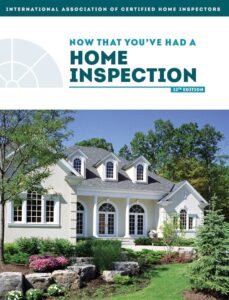What is a Home Inspection?
Before you buy a home, one of the things you should do is to have it thoroughly checked out by a professional home inspector. You should be present for the inspection to get a firsthand explanation of the inspector’s findings and ask questions. With each home inspection, we include a copy of a very informative, illustrated “home-owner’s user manual” Now That You’ve Had a Home Inspection.

The Home Inspection Contingency
A home inspection is used to provide an opportunity for you to identify any major issues with a home prior to closing. It can be used as a contingency in your contract with the seller. This contingency provides that if significant defects are revealed by a home inspection, you can negotiate the price, ask for repairs or credits, or back out of your purchase offer, free of penalty, within a certain timeframe. In this regard, the inspection can easily pay for itself. It should be kept in mind, however, that it is unreasonable to expect that every tiny item found by the home inspector be repaired by the seller.
Upgrading and Planning Ahead
Especially with older homes, a home inspection report is an important tool when it comes to upgrades. It will include typical life expectancies and the approximate age of major items such as the furnace, AC, and water heater. This way, the home buyer may plan to budget for replacement any of these which are aging.
Appraisals vs Inspections
A home inspector will focus on the condition of the property and all of the installed systems, and keep an eye out for any potential health and safety issues. A home appraiser, however, is primarily focused on determining the current market value of the house. The appraiser will use recent sales data in the local area, and other means, to calculate the worth of the property in the current market.
What does a Home Inspection Cover?
A good inspector will examine certain components of the home — as defined by the standards of practice (SOP) that they follow, which will typically go beyond what the State SOP requires — and then produce a report covering his or her findings.
Priority is placed on major issues such as high-dollar repairs, and safety issues, such as missing handrails and trip hazards. A really good inspector will also tell you about routine maintenance that should be performed, which can be a great help if you are a first-time homebuyer.
Some Items Included in the Inspection:
- Exterior walls: Including damaged or missing siding, cracks and whether the soil is too close or in contact with siding.
- Foundation: Including evidence of foundation issues such as cracks and settling.
- Grading: Including proper slope of the ground.
- Garage or Carport: Including the garage door, opener, and framing if visible.
- Roof: Including roof damage, poor installation, or deterioration, and the condition of the gutters and downspouts.
- Interior Inspection: Including floors, walls, ceilings, doors, windows, cabinets, and more.
- Plumbing: Including fixtures, visible leaks, water pressure, types of pipes and where the water shutoff is located.
- Electrical: Including wiring, outlets and GFCI outlets where needed, and the electrical panel.
- Heating, Ventilation, and Air Conditioning: Including whether functioning properly and approximate age.
- Water heater: Including the condition and the age and its useful life expectancy.
- Kitchen Appliances: Including counters, cabinets, oven, range and dishwasher and other appliances.
- Laundry Room: Including proper ventilation of the dryer.
- Fire Safety: Including fire rating of garage door, rversing mechanism, walls and ceiling, and that smoke (and CO) detectors are present on each level of the home.
- Bathrooms: The inspector will check for visible leaks, properly secured toilets, adequate ventilation, and other issues.
